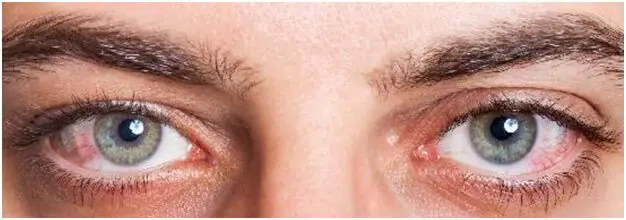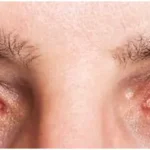Fasting is the process of abstaining from all or some food and fluid for a period of time or both. People fast for a variety of reasons including health and religion. However, it is a complex topic that has both positive and negative effects on the human body. Fasting is a holy ritual performed by many religious communities such as the Hindus, Jains, and Muslims. It is considered to be a way of detoxifying the body and relaxing the soul. However, prolonged fasting can cause some extensive health problems to various parts of our body. Cardiovascular diseases and gastric problems are the most common effects of sustained fasting along with other health consequences too. Dry eye syndrome is one of them. Dry eye syndrome refers to an eye condition when our tear glands cannot produce a sufficient amount of tears to keep the eyes moist and healthy. A thin layer of tear protein must sustain our eyes to keep them moist. In the case of the absence of the layer of the tear proteins, our eyes remain vulnerable to dirt, dust, and irritants. Hence, it further results in a harsh stinging sensation, irritation, burning sensation, redness, and pain in the eye. There are three layers that form the tear protein film. These are oil, mucus, and water. Damage to any of these layers can cause the tear protein film to deplete. This results in dry eyes and makes our eyes prone to irritants and infections.
Normal Causes of Dry Eyes
There are also many causes of dry eyes other than fasting. As we get older, the rate at which we produce tears becomes slower and the quality of tears suffers as some glands start to slow down. This affects the tear film on our eye, leading to dryness in the eye.
Other causes of dry eyes include:
- Side effects of medications
- Some underlying eye conditions like diabetes or an immune system disorder
- Certain environments where our eyes are exposed to dust, smoke or other harmful pollutants
- Eye surgery
- Prolonged use of contact lenses
- Digital eye strain
How fasting causes dry eyes?
During the phase of consistent fasting, our intake of a nutrient-rich diet decreases in quantity. Thus, our body does not get sufficient nutrients to maintain our health every day. In such a case, the most sensitive organ of our body – the eyes become highly vulnerable to disease, infections, and allergens. Therefore, the lack of nutrients that are required by our body to ensure an active functioning of eye muscles and tear glands is the cause of dry eyes. As per medical researchers, the functioning of certain fluids of our body gets altered during the fasting period. In the same context, the components of the tear protein film undergo certain changes. The protein pattern of the tear film alters. Hence, it results in the depletion of the moist layer and causes dry eyes.
Negative Effects of Fasting
Other than dry eyes, fasting can cause a lot of other problems for our general health too like:
1.Slowing down our metabolism
- There is significant evidence that states that fasting may lower our rate of metabolism. When we fast, there is no food being digested by the body and our metabolism rate is lowered to compensate.
2.Lowers blood sugar
- Fasting can cause our blood sugar level to go down, which can make us feel tired and hazy and crave food high in sugar and fats.
3.Weight gain
- We can ironically actually gain weight because of fasting. As the rate of metabolism slows down, our body cannot digest the food we take in leading to an increase in our weight.
Positive Effects of Fasting
However, there are some positive effects that fasting has on our health in general. Here are some of them:
1.Decreases Inflammation
- Chronic inflammation is problematic for our health and is a symptom for many serious diseases like heart disease and cancer.
- Some studies have shown that intermittent fasting can help in decreasing inflammation and help promote better health.
2.May Prevent Neurodegenerative Disorders
- It has been studied in animals that fasting may both boost brain function and help in preventing neurodegenerative disorders.
- Studies have also implied conditions like Alzheimer’s disease and Parkinson’s can be protected or improved by intermittent fasting.
3.Increases Growth Hormone Secretion
- Human Growth Hormone is a type of protein that is very important to many parts of our health and body. It is one of the key components for our growth, metabolism, and weight loss and muscle strength.
- Several studies have proven that fasting causes an increase in growth hormone secretion in our bodies.
Measures To Address the Dry Eye Problem
The tear protein film of human eyes is an important body fluid. To sustain the health of our eyes, it is necessary for us to ensure that no damage occurs to the tear protein layers. Thus, you must drink a good amount of water and consume a nutrient-rich diet at the end of the fasting day. Moreover, intake of flax seeds, almonds, oranges, etc. can also help in reducing the problem of dry eyes. Share this blog with your friends and family who will be fasting during this festival season and ask them to drink a lot of water and consume a nutrient-rich diet to avoid dry eyes.
General Tips to Manage Dry Eyes
We’ve established earlier that there are many causes that lead to dry eyes other than fasting. It is a serious eye condition that should be taken care of to prevent damage to our eyes and sight. Finally, here are some general tips that can help in managing dry eyes:
- Stay clear of the environment that may induce dry eyes. Avoid areas which might be abundant in dust, smoke, or wind.
- Use eye drops or ointments to ensure that your eyes stay lubricated.
- See your doctor if serious symptoms of dry eyes show up. Some of the serious symptoms include:
- Pain which is more than mild irritation.
- Dry mouth.
- Joint pain, stiffness or swelling.
- Continued dryness even after taking preventive steps and precautions.
Home Remedies To Cure Dry Eyes
1.Blink frequently:
Even if you’re fasting, make a conscious effort to blink your eyes in a few minutes. People tend to blink much less while working on a computer, digital display devices etc. The decreased rate aggravates mild dry eye symptoms. Make sure to perform full blink in a way that you squeeze your eyelids together. This action spreads a fresh layer of tears over your eyes.
2.Remove eye makeup thoroughly:
Be it a fasting day or a usual one; people who love to apply makeup can’t resist for a day. Eyeliner, kohl, eye shadows etc. clog the skin and meibomian glands under the eyelashes. Be diligent about removing every bit of makeup from lashes, eyelids and nearby areas before going to bed.
3.Following eye care routine:
It is essential to follow an eye care routine to keep eyes hydrated. Apply moist washcloth for at least three minutes to close eyelids. Gently, wash them with a mild cleanser and moisturiser with eye care cream. You can also put warm compresses of cotton on your eyes to relax them.
4.Wear quality sunglasses:
Wind, dust and other irritants in the air can worsen dry eye symptoms. That’s why it becomes vital to choose quality sunglasses while stepping outside. It would be best if you go for a wrap-style frame as it not only covers your eyes but gives full protection to the nearby areas too.
5.Medicine adjustment:
- People on a particular medication can’t skip themselves even while fasting. Several medicines can acutely cause dry eyes or worsen mild dry eye symptoms. Antidepressants, medicines for controlling blood pressure etc. can exacerbate the situation. Consult with your doctor and adjust the medication.
At Centre for Sight, we genuinely care for your eyes. We serve our patients with eye ailments to the best of our ability and live up to the reputation of being a leading provider of quality eye care.





